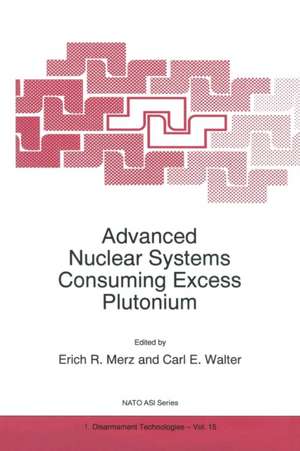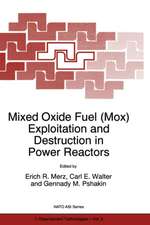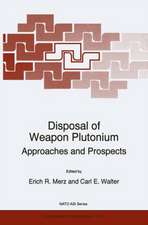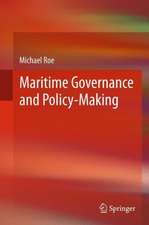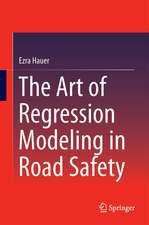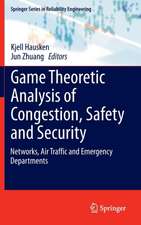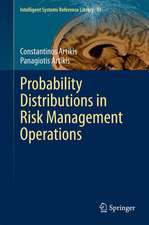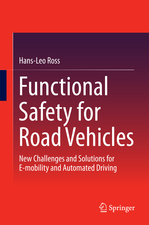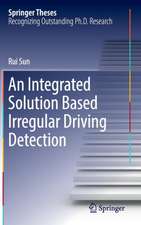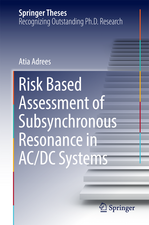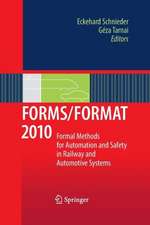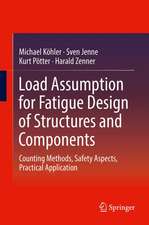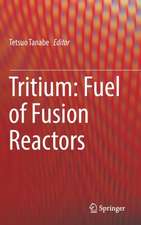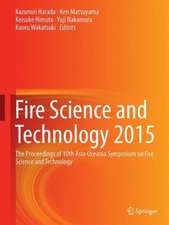Advanced Nuclear Systems Consuming Excess Plutonium: NATO Science Partnership Subseries: 1, cartea 15
Editat de E.R. Merz, Carl E. Walteren Limba Engleză Paperback – 23 oct 2012
The book's conclusion is that the various systems proposed are technically feasible, even though not yet technically mature. The book presents a unique summary and evaluation of all relevant possibilities for burning surplus plutonium, presented by experts from a variety of different disciplines and interests, including the defence establishment. The obvious issue - the non-proliferation of nuclear weapons - is vital, but the matter represents a complex technological challenge that also requires an assessment in economic terms.
Din seria NATO Science Partnership Subseries: 1
- 15%
 Preț: 643.65 lei
Preț: 643.65 lei - 18%
 Preț: 949.23 lei
Preț: 949.23 lei - 18%
 Preț: 951.14 lei
Preț: 951.14 lei - 18%
 Preț: 950.96 lei
Preț: 950.96 lei - 18%
 Preț: 1226.42 lei
Preț: 1226.42 lei - 18%
 Preț: 944.36 lei
Preț: 944.36 lei - 18%
 Preț: 1227.04 lei
Preț: 1227.04 lei - 18%
 Preț: 1220.26 lei
Preț: 1220.26 lei - 18%
 Preț: 947.35 lei
Preț: 947.35 lei - 18%
 Preț: 952.09 lei
Preț: 952.09 lei - 18%
 Preț: 955.56 lei
Preț: 955.56 lei - 15%
 Preț: 643.65 lei
Preț: 643.65 lei - 18%
 Preț: 947.67 lei
Preț: 947.67 lei - 18%
 Preț: 1111.97 lei
Preț: 1111.97 lei - 18%
 Preț: 1230.66 lei
Preț: 1230.66 lei - 5%
 Preț: 2125.27 lei
Preț: 2125.27 lei - 15%
 Preț: 650.86 lei
Preț: 650.86 lei - 18%
 Preț: 949.23 lei
Preț: 949.23 lei - 15%
 Preț: 640.37 lei
Preț: 640.37 lei - 15%
 Preț: 650.37 lei
Preț: 650.37 lei - 18%
 Preț: 1225.16 lei
Preț: 1225.16 lei -
 Preț: 391.40 lei
Preț: 391.40 lei - 18%
 Preț: 945.14 lei
Preț: 945.14 lei - 5%
 Preț: 1407.87 lei
Preț: 1407.87 lei -
 Preț: 398.15 lei
Preț: 398.15 lei -
 Preț: 390.46 lei
Preț: 390.46 lei
Preț: 392.97 lei
Nou
Puncte Express: 589
Preț estimativ în valută:
75.19€ • 78.36$ • 62.26£
75.19€ • 78.36$ • 62.26£
Carte tipărită la comandă
Livrare economică 03-17 aprilie
Preluare comenzi: 021 569.72.76
Specificații
ISBN-13: 9789401037433
ISBN-10: 9401037434
Pagini: 380
Ilustrații: XIII, 362 p.
Dimensiuni: 160 x 240 x 20 mm
Greutate: 0.53 kg
Ediția:Softcover reprint of the original 1st ed. 1997
Editura: SPRINGER NETHERLANDS
Colecția Springer
Seria NATO Science Partnership Subseries: 1
Locul publicării:Dordrecht, Netherlands
ISBN-10: 9401037434
Pagini: 380
Ilustrații: XIII, 362 p.
Dimensiuni: 160 x 240 x 20 mm
Greutate: 0.53 kg
Ediția:Softcover reprint of the original 1st ed. 1997
Editura: SPRINGER NETHERLANDS
Colecția Springer
Seria NATO Science Partnership Subseries: 1
Locul publicării:Dordrecht, Netherlands
Public țintă
ResearchCuprins
1. Introduction to the workshop.- 2. View on the problem of the Plutonium utilization in Russia.- 3. Safety aspects of advanced nuclear systems consuming Plutonium.- 4. Problems of excess Plutonium utilization in nuclear reactors.- 5. Recent neutron physics investigations on the incineration of Plutonium and other Transurania elements.- 6. The benefits of an advanced fast reactor fuel cycle for Plutonium management.- 7. Experience of SSC RF RINR on usage of Uranium-Plutonium oxide fuel in nuclear reactors.- 8. Energy source for the human demand.- 9. Plutonium-based nuclear power and nonproliferation.- 10. The cost of weapons Plutonium disposition through MOX utilisation in existing commercial LWRs.- 11. A realistic Plutonium elimination scheme with fast energy amplifiers and Thorium-Plutonium fuel.- 12. Weapons grade Plutonium destruction in the gas turbine modular helium reactor (GT-MHR).- 13. Accelerator driven systems - some safety and fuel cycle considerations.- 14. Advanced CANDU Systems for Plutonium destruction.- 15. Advanced systems for Plutonium utilization.- 16. Burning of weapon-grade Plutonium in WER and HTGR reactors.- 17. Utilization of excess Plutonium in molten salt reactors.- 18. Accelerator-driven systems - a new perspective on Fission Energy.- 19. On solving the fissionable Materials non-proliferation problem in the closed Uranium-Thorium cycle.- 20. Destruction of Plutonium and other nuclear waste materials using the accelerator-driven transmutation of waste concept.- 21. Environmental & safety problems in Plutonium utilization & power generation.- 22. Accelerator-driven transmutation system with liquid Lead cooling-Basic conditions, layout goals and results.- 23. Plutonium problem and one of the solution techniques.- 24. The utilitarian approach tothe disposition of Plutonium.- 25. Neutron spectrum concerning ex-weapon plutonium degradation and Plutonium utilization in the future.- 26. Problems of radiochemical reprocessing, related to Plutonium utilization.- 27. French Law on waste management research - General view on the partitioning program and current state of partitioning studies.- 28. Self-regulating processes in nuclear reactor.- SUMMARIES of the PAPERS PRESENTED at the WORKSHOP.- WORKSHOP SUMMARY and EVALUATION.
